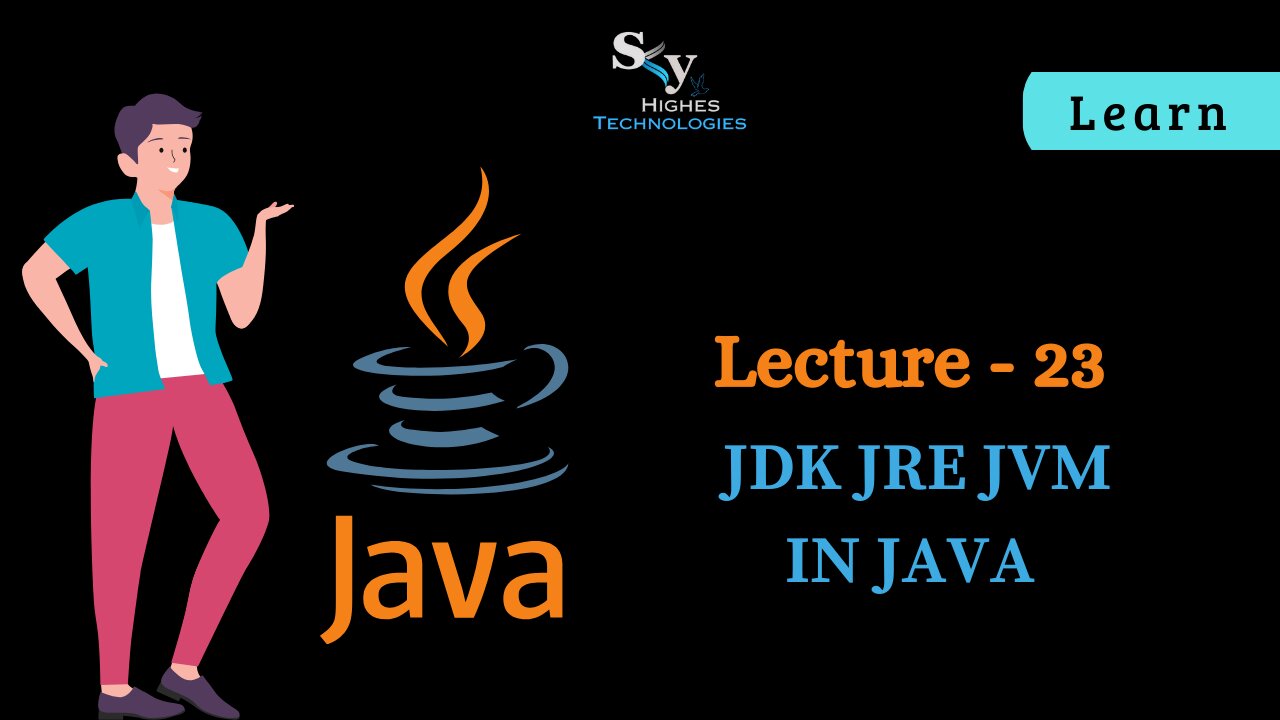Premium Only Content

#23 JDK, JRE, JVM in JAVA | Skyhighes | Lecture 23
JDK, JRE, and JVM are crucial components in the Java ecosystem, and understanding their differences is essential for any Java developer. Here's a breakdown:
1. JDK (Java Development Kit):
Purpose: Development environment for building Java applications.
Components:
JRE (Java Runtime Environment): Provides classes and libraries needed to run Java applications.
Java compiler (javac): Converts Java source code (.java files) into bytecode (.class files).
Java archiver (jar): Packages classes and resources into JAR files for deployment.
Other tools: Class documentation generator (Javadoc), debugger (jdb), appletviewer, etc.
2. JRE (Java Runtime Environment):
Purpose: Execution environment for running Java applications.
Components:
JVM (Java Virtual Machine): Virtual machine that interprets and executes Java bytecode.
Standard libraries: Classes and APIs needed for common tasks like I/O, networking, and GUI development.
3. JVM (Java Virtual Machine):
Purpose: Platform-independent abstraction that executes Java bytecode.
Concept:
Java code is compiled into bytecode, which is machine-independent.
JVM interprets and executes bytecode on any operating system with a compatible JVM implementation.
Provides memory management, garbage collection, and security features.
Relationships:
JDK contains JRE and additional development tools.
JRE contains JVM and standard libraries.
JVM interprets Java bytecode regardless of source platform.
Choosing the right one:
JDK: Choose if you need to develop Java applications.
JRE: Choose if you only need to run compiled Java applications.
Additional Resources:
I hope this clarifies the differences between JDK, JRE, and JVM. Feel free to ask if you have any further questions!
-
 1:49:27
1:49:27
Game On!
19 hours ago $3.30 earnedIt's A FOOTBALL Friday! NFL In Brazil! Chiefs vs Chargers Preview!
34.7K1 -
 LIVE
LIVE
JuicyJohns
1 hour ago $0.34 earned🟢#1 REBIRTH PLAYER 10.2+ KD🟢
74 watching -
 14:31
14:31
Adam Does Movies
14 hours ago $3.20 earnedAlien: Earth Episode 5 - Recrap
45.5K2 -
 12:54
12:54
Michael Button
18 hours ago $3.06 earnedWhat If We’re Just the Most Recent Civilization?
20.9K14 -
 1:15:19
1:15:19
Surviving The Survivor: #BestGuests in True Crime
2 days agoDonna Adelson's Defense Witnesses Get Caught Up on Stand; Will Jurors Believe Them?
10.4K -
 LIVE
LIVE
The Bubba Army
23 hours agoTyson vs Mayweather SUPERFIGHT! - Bubba the Love Sponge® Show | 9/05/25
1,528 watching -
 25:26
25:26
World2Briggs
20 hours ago $1.40 earnedTop 15 Most Visited Cities in the World
18.5K1 -
 2:01:58
2:01:58
BEK TV
1 day agoTrent Loos in the Morning - 9/05/2025
17.3K -
 LIVE
LIVE
FyrBorne
3 hours ago🔴Warzone M&K Sniping: This May Be The Most Broken Update Yet
75 watching -
 10:59
10:59
Degenerate Jay
17 hours ago $1.86 earned007 First Light Is The James Bond Game Fans Deserve
29.6K2